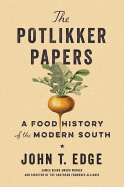
Pot liquor, or potlikker, is the seasoned liquid left behind from boiling greens; it was historically a salvage food consumed by the poor. Like a lot of roadside shack cuisine (fried chicken, barbecue) turned white tablecloth fare, potlikker has undergone its own gentrification in recent years, emerging as an elegant finishing sauce for grilled fish or a broth used to poach trout and flavor noodles. Foodways Alliance director and food historian John T. Edge (Southern Belly) examines how salvage and roadside food have redefined American cuisine and the cultural history of the South.
Edge begins with profiles of Georgie Gilmore (a cook whose sale of sandwiches helped fund the Montgomery bus boycotts of the 1950s) and Fannie Lou Hamer (a farmer who advocated for black property rights). These two women helped facilitate the rise of black power in the 1960s. In the 1970s, black migration to urban areas for employment prompted savvy entrepreneurs like Harland Sanders to turn the tastes of home, like fried chicken, into a fast-food "entrepreneurial grail." As Jimmy Carter's presidential campaign popularized grits and the ideals of the New South, cooks like Edna Lewis "challenged chefs to learn 'from those who worked hard, loved the land, and relished the fruits of their labors.' "
The Potlikker Papers is a loving homage to Edge's Southern roots, as well as a work of "remembering through food, an act of recollection that gathers sometimes lost narratives to tell old stories in new ways." --Nancy Powell, freelance writer and technical consultant

